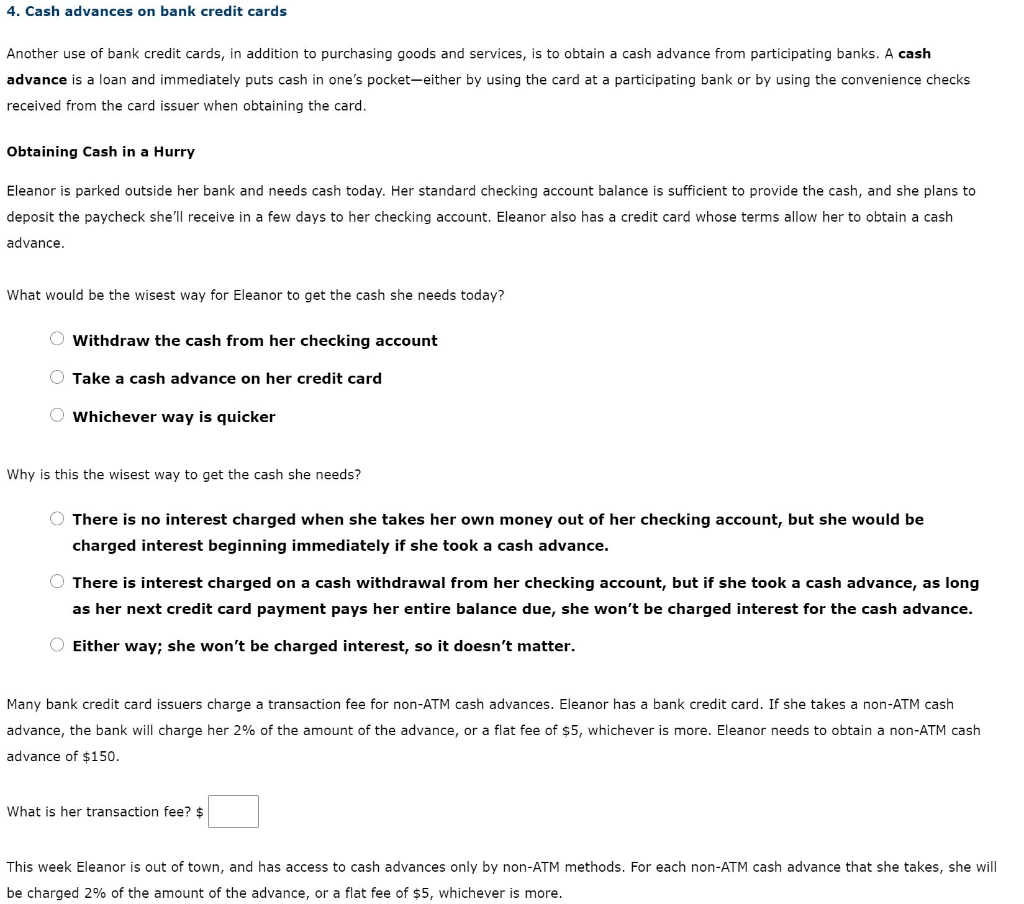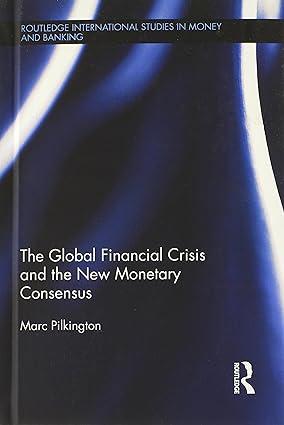

4. Cash advances on bank credit cards Another use of bank credit cards, in addition to purchasing goods and services, is to obtain a cash advance from participating banks. A cash advance is a loan and immediately puts cash in one's pocket-either by using the card at a participating bank or by using the convenience checks received from the card issuer when obtaining the card. Obtaining Cash in a Hurry Eleanor is parked outside her bank and needs cash today. Her standard checking account balance is sufficient to provide the cash, and she plans to deposit the paycheck she'll receive in a few days to her checking account. Eleanor also has a credit card whose terms allow her to obtain a cash advance. What would be the wisest way for Eleanor to get the cash she needs today? O Withdraw the cash from her checking account Take a cash advance on her credit card Whichever way is quicker Why is this the wisest way to get the cash she needs? O There is no interest charged when she takes her own money out of her checking account, but she would be charged interest beginning immediately if she took a cash advance. There is interest charged on a cash withdrawal from her checking account, but if she took a cash advance, as long as her next credit card payment pays her entire balance due, she won't be charged interest for the cash advance. Either way; she won't be charged interest, so it doesn't matter. Many bank credit card issuers charge a transaction fee for non-ATM cash advances. Eleanor has a bank credit card. If she takes a non-ATM cash advance, the bank will charge her 2% of the amount of the advance, or a flat fee of $5, whichever is more. Eleanor needs to obtain a non-ATM cash advance of $150. What is her transaction fee? $ This week Eleanor is out of town, and has access to cash advances only by non-ATM methods. For each non-ATM cash advance that she takes, she will be charged 2% of the amount of the advance, or a flat fee of $5, whichever is more. Eleanor took two cash advances during the week, each for $75. What is the total of her cash advances for that week? $ What would the transaction fee be, based on percentage, for each cash advance? $ What would the minimum transaction fee be for each cash advance? $ Which transaction fee will be charged for each of Eleanor's advances? $ What will be the total of her transaction fees for the week? $ If Eleanor had taken just one cash advance for $150 at the beginning of the week, what would her transaction fee have been? $ lower transaction fees by $ 4. Cash advances on bank credit cards Another use of bank credit cards, in addition to purchasing goods and services, is to obtain a cash advance from participating banks. A cash advance is a loan and immediately puts cash in one's pocket-either by using the card at a participating bank or by using the convenience checks received from the card issuer when obtaining the card. Obtaining Cash in a Hurry Eleanor is parked outside her bank and needs cash today. Her standard checking account balance is sufficient to provide the cash, and she plans to deposit the paycheck she'll receive in a few days to her checking account. Eleanor also has a credit card whose terms allow her to obtain a cash advance. What would be the wisest way for Eleanor to get the cash she needs today? O Withdraw the cash from her checking account Take a cash advance on her credit card Whichever way is quicker Why is this the wisest way to get the cash she needs? O There is no interest charged when she takes her own money out of her checking account, but she would be charged interest beginning immediately if she took a cash advance. There is interest charged on a cash withdrawal from her checking account, but if she took a cash advance, as long as her next credit card payment pays her entire balance due, she won't be charged interest for the cash advance. Either way; she won't be charged interest, so it doesn't matter. Many bank credit card issuers charge a transaction fee for non-ATM cash advances. Eleanor has a bank credit card. If she takes a non-ATM cash advance, the bank will charge her 2% of the amount of the advance, or a flat fee of $5, whichever is more. Eleanor needs to obtain a non-ATM cash advance of $150. What is her transaction fee? $ This week Eleanor is out of town, and has access to cash advances only by non-ATM methods. For each non-ATM cash advance that she takes, she will be charged 2% of the amount of the advance, or a flat fee of $5, whichever is more. Eleanor took two cash advances during the week, each for $75. What is the total of her cash advances for that week? $ What would the transaction fee be, based on percentage, for each cash advance? $ What would the minimum transaction fee be for each cash advance? $ Which transaction fee will be charged for each of Eleanor's advances? $ What will be the total of her transaction fees for the week? $ If Eleanor had taken just one cash advance for $150 at the beginning of the week, what would her transaction fee have been? $ lower transaction fees by $








